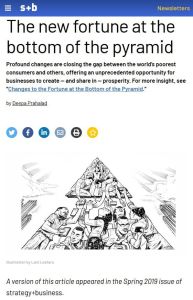加入 getAbstract 阅读摘要

加入 getAbstract 阅读摘要
Deepa Prahalad
The New Fortune at the Bottom of the Pyramid
Profound changes are closing the gap between the world’s poorest consumers and others, offering an unprecedented opportunity for businesses to create – and share in – prosperity.
Strategy+business, 2019
看看什么内容?
What’s good for the “bottom of the pyramid” can be good for the bottom line, too.
Recommendation
The dramatic decrease in extreme poverty globally represents a signal achievement of the past half century, and it’s not only benefiting the billion-plus people whose lives have been transformed. Business is benefiting, too. A new optimism is emerging – that what’s good for the “bottom of the pyramid” can be good for the bottom line. Writing for Strategy+business, Deepa Prahalad, an expert on innovation in emerging markets, describes the burgeoning vibrancy of the world’s poorer markets and explains why some business leaders are seeing profit in reducing poverty.
Summary
About the Author
Deepa Prahalad is a speaker, design strategist and expert on innovation in emerging markets.



















Comment on this summary